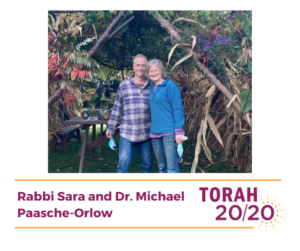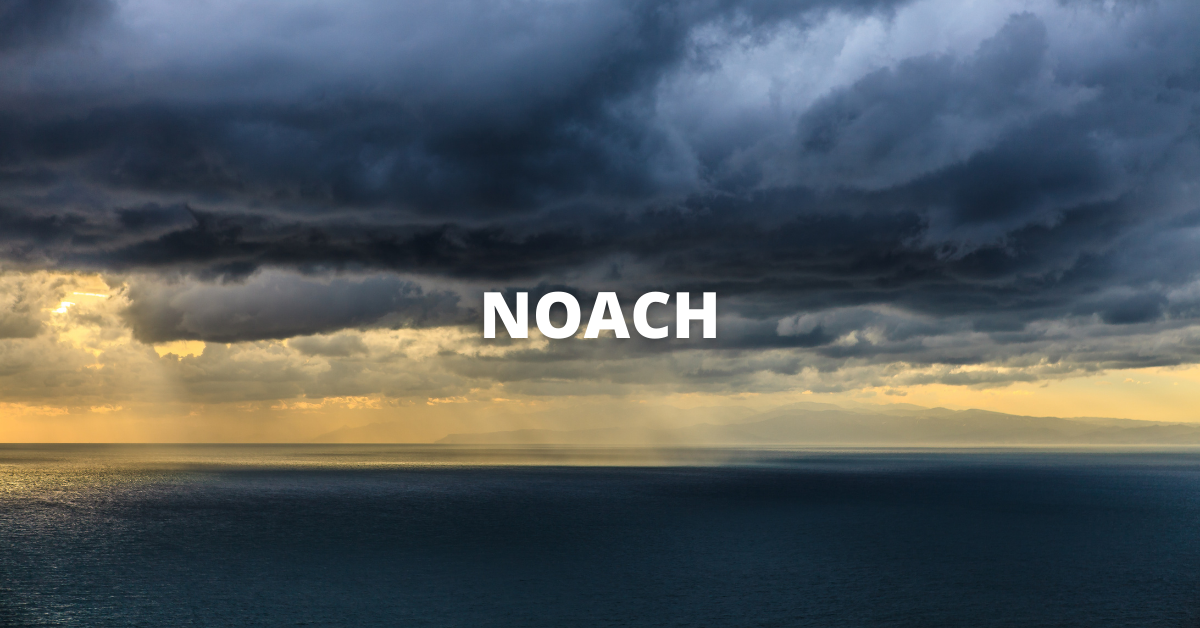A D’var Torah for Parshat Noach by Rabbi Sara and Dr. Michael Paasche-Orlow
This summer the oldest survivors in each of our families died: Ursula Seligmann of Essen and Ellen Katz of Offenbach. Each escaped Germany almost at the last minute on trains alone as teenagers. They lost many members of their families to the death camps, and went on to live long good lives in this country.
At the end of Parshat Bereshit, we hear about the long lives lived by Noah and his predecessors and the death of Noah’s grandfather Methuseleh, just before the destruction of the world. (According to midrash, time for mourning was given before the flood waters were released – a hint of mercy in a dark time – see Talmud Sanhedrin 108b.) The greats of the previous era are passing on – just prior to the flood in which the whole of humanity would be brought down, leaving Noah and Naamah to rebuild the world. The Kindertransport evokes shadows of the original ark, and now that generation too is dying.
Today, we are witness to massive destruction by fire, water, and the pandemic pestilence of COVID-19. And yet, in many ways it is the jagged rips in civil society that feel most threatening and seem to reveal that the earth is becoming corrupt again in the eyes of God. One of our children asked us recently when talking about Ursula and Ellen: how will we know when it is time to leave?
Ursula and Ellen’s families were not told when it was time – and we will also not have directions spelled out for us explicitly for how to save our world.
To be clear, in our parshah, this is managed by God. Noah never had to decide about the timing of anything. God specifically tells Noah when it is time to enter the ark (Gen. 7:1) and then when it is time to exit (Gen. 8:16).
But this leads to an important question: What was the purpose of the window that God commanded in the building of the ark? Noah clearly does not need it to determine when it is time to leave, even though this is commonly how the story of the dove is understood. God tells them to leave nearly two months after the third flight of the dove!
The Hebrew word in Gen. 6:16 צֹ֣הַר, tzohar, is translated in this verse as window. However, the word tzohar is typically translated as noonday sun (in the plural, tzohorayim, Gen. 43:16) or oil, a source of bright light (Deut. 12:17) ; only here in the Torah is it translated as a window. Rashi notes the atypical use of this word and comments that the tzohar here was either a window or a stone that glowed and gave forth light. Only in verse 8:6 when Noah was commanded to open it, was this light source called חַלוֹן /chalon – a window.
The window – where the dove returns with an olive branch – is about hope and connection. The window is escape from the crushing waves of the endless news cycle of fear and violence. The window is a possibility of change – of redemption. Even as the ark was built to protect, it was also a dark and scary place.
As health care workers, we have experienced the need for windows, for light, in the face of illness. In the time of COVID-19, with no family or visitors allowed, patients have often been alone and scared with oxygen levels dropping – under the sea of the cytokine storm. Our health care teams have tried to serve as an ark, to sustain and keep people alive against the tide. And we have tried to be the windows in our relationships with patients, and also in making connections to the outside world, holding up iPads for Zoom and Facetime connections for patients who have not seen family in weeks. Yet our hospitals and nursing homes, built to provide protection, often became places of overwhelming death. And we have searched and are searching for sources of light and of hope.
How do we hold on to hope in the face of fear when vulnerable elders are dying from COVID? Black, Hispanic, and Indigenous People too are dying at much higher rates than other groups. Indeed, inequality and racial injustice is rampant. The rain seems not to stop. Anxiety and depression have skyrocketed. Where is the window, the noonday sun, the wind that will blow across the earth and push back the waters?
The flood was a traumatic event in the life of humanity, one in which great numbers were killed, and survivors were left to rebuild the world. Our parents’ generation knows this from the Holocaust, whose memories are being evoked daily as people fear the pandemic and the rise of hate. The post-traumatic stress episodes intermingle with fear from all the current stressors that are coming down like sheets of water.
It can feel like too much to build a whole ark – but you do not need to! Even for Noah, it took over 50 years to build. COVID-19 is likely to take a long time to recede. It is extremely important to find places of light, and to take care of yourself. And we also need to find ways to take care of the people who are in a dark tumultuous place. Open windows, see the brightness in that which we find precious, and let light in. This is buried within the words themselves, as the root of the word for sickness (חוֹלֶה/choleh ) is the same as the root for the word for window (חַלוֹן /chalon).
 Care for your elders. Wear a mask. Virtually visit the vulnerable. Be an anti-racist by making sure everyone has safe working conditions with proper personal protective equipment. Be an anti-racist by opening your heart and building honest relationships with people of all races. Reach out to people who are not okay. Find ways to bring light into the world for people who are anxious and depressed. Be the window.
Care for your elders. Wear a mask. Virtually visit the vulnerable. Be an anti-racist by making sure everyone has safe working conditions with proper personal protective equipment. Be an anti-racist by opening your heart and building honest relationships with people of all races. Reach out to people who are not okay. Find ways to bring light into the world for people who are anxious and depressed. Be the window.
Rabbi Sara Paasche-Orlow, BCC, serves as the Director of Spiritual Care at Hebrew Senior Life in Boston and is the co-author of Death Bed Wisdom of the Hasidic Masters. Dr. Michael Paasche-Orlow, MD, MA, MPH is a Professor of Medicine at Boston University School of Medicine.


